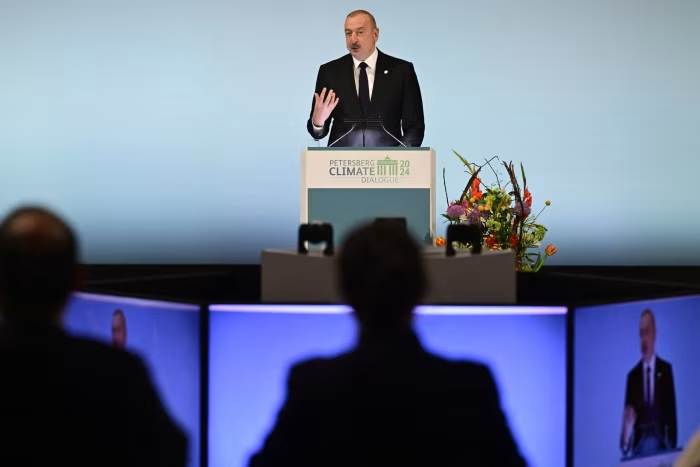https://www.jihadplay.com
More than 200 female business and policy leaders from around the world gathered at the sleek offices of wind energy company Ørsted on Madison Avenue during the recent New York climate week, in an evening that ended with a team photo of women making a fist, Rosie-the-Riveter style. Among those backing the new women’s leadership coalition to be formally launched at COP29 are climate veterans such as former UN executive secretary Patricia Espinosa, German envoy Jennifer Morgan, UK envoy Rachel Kyte and former French envoy Laurence Tubiana. Their show of strength was motivated by the failure of the Azerbaijani COP29 presidency to include even a single woman in an initial 28-member organising committee. After a backlash, President Ilham Aliyev expanded the group to 42 to include 12 women and another two men. It has since swelled to 55 members, but has not reached gender parity. COP29 president Mukhtar Babayev’s own six-person team is now evenly split, however.
https://www.ft.com/content/cff72396-4f05-471e-9302-c323cfcd90b9
This COP29 mis-step prompted 75 female leaders from business, civil society and academia to sign a letter to President Aliyev, and led to the launch of the Women Leading on Climate initiative, driven by former Canadian climate minister Catherine McKenna and María Mendiluce, head of the We Mean Business Coalition. In the past 10 years, only one woman has held the host-country-appointed position of COP president: Chile’s former minister for the environment Carolina Schmidt, who oversaw COP25.
https://www.ft.com/content/cff72396-4f05-471e-9302-c323cfcd90b9
hat was held in Cancún in 2010. Espinosa, herself, took the baton from Christiana Figueres, who led the COP that delivered the historic Paris agreement on global warming. Since Stiell took on the UN climate chief role two years ago, he has had to deal with a number of serious gender-related issues among the national delegations. In his first year, female delegates at the UN climate talks in Egypt at COP27 formally complained about being bullied, abused and sexually harassed by male negotiators, prompting a letter of protest from two dozen countries. Camila Zepeda, Mexico’s head of delegation, was among those who told the Financial Times that she had suffered sexual harassment. Further charges were made at a negotiating session in Bonn last year, where Stiell closed the talks by saying he had been “made aware that inappropriate behaviour has taken place during this session”. He said: “Let me make a clear statement — harassment, be it in the form of sexism, bullying or sexual harassment, is not acceptable in the UNFCCC process.” UN climate change executive secretary Patricia Espinosa, right, and Chilean Minister of Environment and COP25 President Carolina Schmidt in Madrid, Spain, in 2019, the only time in a decade where a woman has led the talks © Sean Gallup/Getty Images Behind the scenes, more women than ever are now involved in country negotiations, as part of the working groups at the UN programme. Analysis by the Gender Action Tracker campaign group shows that the percentage of women party delegates has risen to almost 48 per cent at the sessions held at the Bonn UN climate headquarters in the past year. But, at the COPs held in a rotation of national capital cities, the level is about one-third. At the head of delegation level, often a ministerial role, it falls to about one-fifth. The more women [feel they] can step up, the more you can have transformational change Catherine McKenna, Canadian climate minister The essential work that the country negotiators do is exemplified by US deputy envoy, Sue Biniaz, dubbed “the closer” by the New York Times. The former lead climate lawyer for the US state department has been the right hand of many heads of delegation over the decades, including John Kerry and Todd Stern. She is regarded as a “warrior”, by Canada’s McKenna. McKenna, herself, has been among the past female heads of delegation, leading the Canadian team at COP23 in Bonn as then minister of environment and climate change — a role that earned her the epithet “climate Barbie”, which she has since embraced. In Baku this week, as chair of the High Level Expert Group, she will tell the UN secretaries-general, in blunt terms, what must be delivered by way of “real” climate plans from the private sector. The first such report she delivered — at COP27 in Egypt — hit a nerve, as she identified “some companies, in particular financial institutions, that don’t understand that when you make a net zero commitment it means something”. Among the background issues McKenna identifies at corporate level is an isolation of the sustainability agenda often left to women in the executive ranks. “Power can’t be you doing it alone and feeling you are an outlier in your company,” she says. “The more women [feel they] can step up, the more you can have transformational change.”


